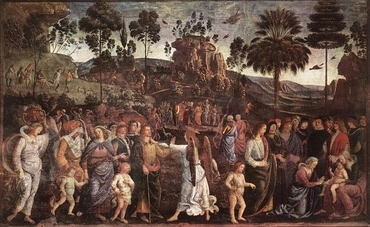7041. 'And he was on the way in the lodging-place' means that the attention of the descendants of Jacob was focused on outward forms without their inner meaning. This becomes clear from the representation of 'Moses' here. In what has gone before and in what will follow the subject in the internal sense is the spiritual Church, meant by 'the children of Israel'; but the three verses here deal with how the Church was to have been established among Jacob's descendants but could not in fact be established among them because their attention was focused on outward forms without their inner meaning. Here therefore Moses does not represent the Law or the Word; instead he represents that nation, descendants of Jacob, whose leader he was to become, and so represents that nation's worship as well. For everywhere in the Word a leader, judge, or else king represents the nation or people whose leader, judge, or king he is since he is its head, see 4789. This explains why Moses is not referred to here by name, though he is meant by the one who 'was on the way in the lodging-place', and why Jehovah at this point 'came to meet him and sought to kill him', when yet previously He had commanded him so clearly to go and return to Egypt. His being 'on the way means what is established, while 'the lodging-place' means the external natural or that which exists on the level of the senses, 5495. And since, as has been stated, the subject is the Church that was to have been established among Jacob's descendants, the level on which that nation focused is meant, namely an external level without any internal level, and so an external natural level or that of the senses, separated from any inner level. When separated from any inner level the sensory level is full of illusions and consequently falsities, and it stands in opposition to forms of the truth and good of faith, see 6948, 6949.
[2] Before the things that come next are explained, see what has been shown already regarding the descendants of Jacob:
Among them there was a representative of the Church, but no real Church, 4281, 4288, 6304.
Divine worship among them was wholly external without anything internal, and they were driven to that worship by external means, 4281, 4433, 4844, 4847, 4865, 4899, 4903.
They were not chosen, yet they stubbornly insisted that they should be the Church, 4290, 4293.
They were such that they could represent holy things even though they were governed by bodily and worldly kinds of love, 4293, 4307.
That nation was like this right from the start, 4314, 4316, 4317.
Very many other things which have been shown concerning that nation, 4444, 4459 (end), 4503, 4750, 4815, 4818, 4820, 4825, 4832, 4837, 4868, 4874, 4911, 4913, 5057, 6877.







